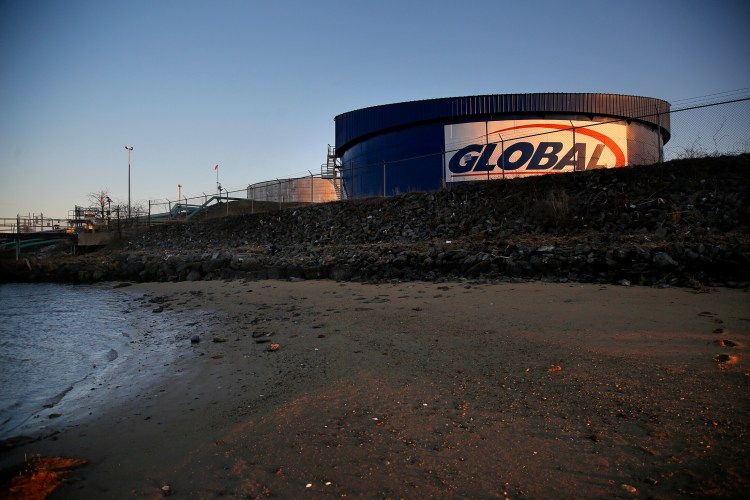SOUTH PORTLAND — City residents and others will have two additional months to comment on a controversial proposed settlement between the U.S. Environmental Protection Agency and Global Partners LP over alleged violations of the federal Clean Air Act at its petroleum storage facility on the Fore River.
The deadline to submit comments to the U.S. Department of Justice has been extended from May 1 to July 1, according to a notice published Thursday in the Federal Register.
The EPA filed a federal lawsuit against Global on March 25, charging that the Massachusetts-based company has for several years emitted higher levels of volatile organic compounds, or VOCs, than allowed under its emissions license from the Maine Department of Environmental Protection.
City officials were surprised by the lawsuit and sought an extension to the comment period after residents complained that the EPA failed to notify the city about Global’s alleged air quality violations and didn’t include the city in negotiating a settlement that many say is insufficient.
Mayor Claude Morgan said he was glad the EPA granted the extension because it indicates that the agency is now paying attention to the city’s concerns. However, he said, the city sought the extension when the City Council feared it couldn’t meet the May 1 deadline.
“Now we’re in a 60-day holding pattern we don’t need,” Morgan said, though he acknowledged it will allow more people to weigh in on the proposed settlement.
Filed in U.S. District Court in Portland, the lawsuit came with a consent decree negotiated between EPA officials and Global representatives. City officials and others had until May 1 to submit comments on the proposed settlement that would be taken into consideration by federal officials before the consent decree became final.
Under the proposed settlement, Global would pay a $40,000 fine and invest at least $150,000 in a program to upgrade or replace wood stoves in Cumberland County with cleaner-burning, more efficient heating equipment. Global also must apply for a revised license from the Maine DEP and take steps to reduce VOC emissions at the facility.
The city submitted comments by the May 1 deadline, asking for an alternative settlement that would make Global pay to establish a citywide air quality monitoring program, conduct a public health survey, hire a public health officer and help city residents install solar panels and heat pumps to reduce fossil fuel emissions. The city didn’t specify a total dollar amount but said Global should be assessed daily civil penalties as outlined in federal law, ranging from $32,500 per day for each violation after March 15, 2004, to $97,229 per day for each violation after Nov. 2, 2015.
Meanwhile, the City Council in neighboring Portland, across the Fore River, is expected to consider a resolution Monday asking that the consent decree provide a similar air quality monitoring program in that city.
Global is charged with storing liquid asphalt and No. 6 heavy residual fuel oil in huge heated tanks that have the potential to emit more than 50 tons of VOCs into the air each year. That’s more than double the 21.9 tons allowed under its emissions license issued in 2013 by the Maine DEP.
However, Maine DEP officials say Global hasn’t violated its emissions cap based on data submitted by the company. Instead, state officials say, the EPA’s Northeast office changed the way VOCs were measured in emissions tests conducted at the South Portland facility in 2012 and 2013.
Given the disagreement between the two agencies, and the EPA’s refusal to publicly explain its testing, the city has asked the EPA to provide documents explaining the basis of its complaint against Global. Global representatives have said they intend to work with the city and environmental officials to reach an agreement.
VOCs are chemicals that become gases at ambient pressure and temperatures. Major sources are industrial processes that use solvents, vehicle emissions, evaporation from petroleum storage facilities and forest fires. Many are hazardous to human health and some, including benzene, are classified as carcinogenic, according to the World Health Organization and other health agencies.
VOCs contribute to smog and can produce adverse health effects such as eye, nose and throat irritation, headaches, nausea, and damage to the liver, kidneys and central nervous system, the EPA said. VOCs also contribute to ground-level ozone, which can trigger a variety of health problems, particularly for children, senior citizens and anyone with lung conditions such as asthma.
Send questions/comments to the editors.


